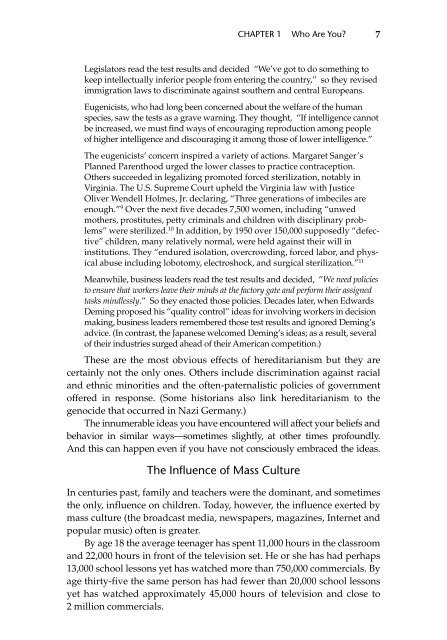Beyond Feelings
Beyond Feelings
Beyond Feelings
You also want an ePaper? Increase the reach of your titles
YUMPU automatically turns print PDFs into web optimized ePapers that Google loves.
CHAPTER 1 Who Are You?<br />
Legislators read the test results and decided “We’ve got to do something to<br />
keep intellectually inferior people from entering the country,” so they revised<br />
immigration laws to discriminate against southern and central Europeans.<br />
Eugenicists, who had long been concerned about the welfare of the human<br />
species, saw the tests as a grave warning. They thought, “If intelligence cannot<br />
be increased, we must find ways of encouraging reproduction among people<br />
of higher intelligence and discouraging it among those of lower intelligence.”<br />
The eugenicists’ concern inspired a variety of actions. Margaret Sanger’s<br />
Planned Parenthood urged the lower classes to practice contraception.<br />
Others succeeded in legalizing promoted forced sterilization, notably in<br />
Virginia. The U.S. Supreme Court upheld the Virginia law with Justice<br />
Oliver Wendell Holmes, Jr. declaring, “Three generations of imbeciles are<br />
enough.” 9 Over the next five decades 7,500 women, including “unwed<br />
mothers, prostitutes, petty criminals and children with disciplinary problems”<br />
were sterilized. 10 In addition, by 1950 over 150,000 supposedly “defective”<br />
children, many relatively normal, were held against their will in<br />
institutions. They “endured isolation, overcrowding, forced labor, and physical<br />
abuse including lobotomy, electroshock, and surgical sterilization.” 11<br />
Meanwhile, business leaders read the test results and decided, “We need policies<br />
to ensure that workers leave their minds at the factory gate and perform their assigned<br />
tasks mindlessly.” So they enacted those policies. Decades later, when Edwards<br />
Deming proposed his “quality control” ideas for involving workers in decision<br />
making, business leaders remembered those test results and ignored Deming’s<br />
advice. (In contrast, the Japanese welcomed Deming’s ideas; as a result, several<br />
of their industries surged ahead of their American competition.)<br />
These are the most obvious effects of hereditarianism but they are<br />
certainly not the only ones. Others include discrimination against racial<br />
and ethnic minorities and the often-paternalistic policies of government<br />
offered in response. (Some historians also link hereditarianism to the<br />
genocide that occurred in Nazi Germany.)<br />
The innumerable ideas you have encountered will affect your beliefs and<br />
behavior in similar ways––sometimes slightly, at other times profoundly.<br />
And this can happen even if you have not consciously embraced the ideas.<br />
The Influence of Mass Culture<br />
In centuries past, family and teachers were the dominant, and sometimes<br />
the only, influence on children. Today, however, the influence exerted by<br />
mass culture (the broadcast media, newspapers, magazines, Internet and<br />
popular music) often is greater.<br />
By age 18 the average teenager has spent 11,000 hours in the classroom<br />
and 22,000 hours in front of the television set. He or she has had perhaps<br />
13,000 school lessons yet has watched more than 750,000 commercials. By<br />
age thirty-five the same person has had fewer than 20,000 school lessons<br />
yet has watched approximately 45,000 hours of television and close to<br />
2 million commercials.<br />
7


